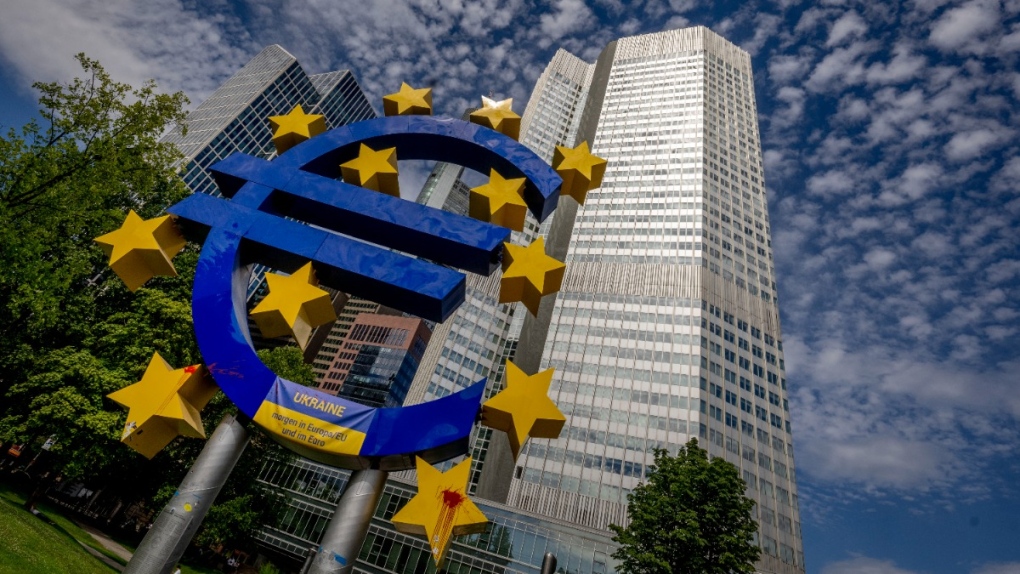FRANKFURT, Germany –
Inflation hit a new record in the 19 countries that use the euro currency, fuelled by out-of-control prices for natural gas and electricity due to Russia’s war in Ukraine. Economic growth also slowed ahead of what economists fear is a looming recession, largely as a result of those higher prices sapping Europeans’ ability to spend.
Annual inflation reached 10.7% in October, the European Union’s statistics agency, Eurostat, reported Monday. That is up from 9.9% in September and the highest since statistics began to be compiled for the eurozone in 1997.
Natural gas prices skyrocketed in the wake of the invasion of Ukraine as Russia throttled back pipeline supplies to a trickle of what they were before the war. Europe has had to resort to expensive shipments of liquefied gas that come by ship from the U.S. and Qatar to keep generating electricity and heating homes.
While liquid gas succeeded in filling Europe’s storage for the winter, the higher prices have made some industrial products such as steel or fertilizer expensive or simply unprofitable to make. Consumer spending power has been drained at shops and elsewhere as more income goes to pay for fuel and utility bills and as basics such as food become more expensive.
Natural gas prices for short-term purchases have eased recently but remain high on markets for coming months, suggesting that costly energy may be a persistent drag on the economy. A survey of professional forecasts last week by the European Central Bank showed expectations for inflation next year rose to 5.8% from 3.6% predicted three months ago.
The inflation outbreak has been an international phenomenon, sending price increases to near 40-year highs in the U.S. as well.
Eurostat figures showed prices for food, alcohol and tobacco have increasingly joined energy prices as a major contributor, rising 13.1%, while energy prices rose an astronomical 41.9% from a year earlier.
Inflation figures varied widely by country, from 7.1% in France to 16.8% in the Netherlands among the biggest member economies, while the highest were in the three Baltic countries: Estonia at 22.4%, Latvia at 21.8%, and Lithuania at 22%.
The economy, which had been rebounding from the COVID-19 pandemic, showed growth of 0.2% in the July-September period, slowing from 0.8% in the second quarter. Economists say a major reason is higher prices, and many are predicting the economy will shrink over the last months of this year and the first part of next year.
The growth in gross domestic product was higher than expected because of extensive government support that softened the blow to people’s incomes from inflation as well as pent-up savings that consumers had left over from the worst of the pandemic restrictions, said Joerg Zeuner, chief economist at Union Investment.
“However, there’s no cause for celebration,” he said. “The GDP numbers, along with many other indicators, show that the economy has clearly lost steam over the summer.”
With more recent data weakening, “it is a matter of how deep the recession will be and not if there will be one,” wrote economists at Oxford Economics.
Higher inflation has sent a chain of tremors through the economy and financial markets.
It has led the European Central Bank to raise interest rates at the fastest pace in its history with back-to-back three-quarter point increases at its Oct. 27 and Sept. 8 meetings. That has sent market borrowing costs higher for companies and governments and raised concerns that the war on inflation will hurt growth.
Higher rates by the ECB and the U.S. Federal Reserve also have roiled markets for stocks and bonds, which had been supported by years of low central bank benchmarks and money-printing stimulus.
Meanwhile, higher bond market costs for governments remain a concern for heavily indebted eurozone countries such as Italy.
Source link
Related

























